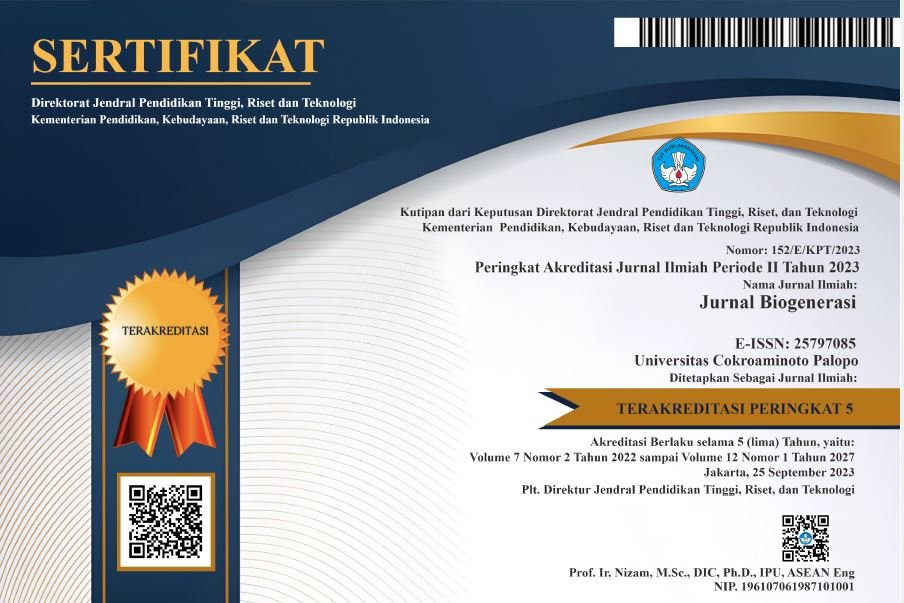PENGEMBANGAN E-MODUL BIOLOGI APLIKATIF-INTEGRATIF BERBASIS PEMBELAJARAN BERDIFERENSIASI UNTUK MATERI VIRUS DI SMA
DOI:
https://doi.org/10.30605/biogenerasi.v10i2.5733Keywords:
biology e-module, application-integration, differentiated learningAbstract
This study aims to develop an applicative-integrative E-Module (Electronic Module) based on differentiated learning as a form of support for the implementation of the Independent Curriculum in Senior High Schools. This study uses a Research and Development (R&D) approach by adapting the 4D development model developed by Thiagarajan, Semmel, and Semmel. This model consists of four main stages, namely Define, Design, Develop, and Disseminate. Thus, it can be concluded that the RPP for the Virus material is included in the "valid" category and is ready to be implemented. Based on the practicality criteria that have been set, it can be concluded that the Biology E-Module for Virus Material from the aspect of teacher response is called "Practical". The percentage of students with a minimum level of competency mastery in the competent category is 92%. So according to the success criteria, namely a minimum of 90% of students in the minimally competent category, the mastery of student competencies has met the classical standards.
Downloads
References
Selviani, I. (2019). Pengembangan Modul Biologi Problem Based Learning Untuk Meningkatkan Kemampuan Berpikir Kritis Peserta Didik SMA. IJIS Edu: Indonesian Journal of Integrated Science Education, 1(2), 147-154.
Daga, A. T. (2021). Makna Merdeka Belajar dan Penguatan Peran Guru di Sekolah Dasar. Jurnal Educatio, 7(3), 1075–1090. https://doi.org/10.31949/educatio.v7i3.1279
Hake, R. R. (1999). Analyzing Change/Gain Scores. Dept. of Physics Indiana University. Unpublished.[Online] URL: http://www. Physics. Indiana. Edu/~ Sdi/AnalyzingChange-Gain. pdf, 1(1), 1-4.
Yulida, A. M. (2024). PENGEMBANGAN E-MODUL BERBASIS FLIPBOOK INTERAKTIF DALAM MENUNJANG PEMBELAJARAN BERDIFERENSIASI PADA MATA PELAJARAN IPS KELAS VII SMP ADHYAKSA 1 JAMBI (Doctoral dissertation, Universitas Jambi).
Helfidayati. (2016). Peran Bahan Ajar IPA Terpadu Tipe Connected Pada Tema Pemanasan Global Terhadap Penguasaan Konsep Siswa. Universitas Pendidikan Indonesia. Jogjakarta
Herwina, W. (2021). Optimalisasi Kebutuhan Siswa dan Hasil Belajar dengan Pembelajaran Berdiferensiasi. PERSPEKTIF Ilmu Pendidikan, 35(2), 175–182.
Istiq’faroh, N. (2020). Relevansi Filosofi Ki Hajar Dewantara sebagai Dasar Kebijakan Pendidikan Nasional Merdeka Belajar di Indonesia. Lintang Songo: Jurnal Pendidikan, 3(2), 1–10.
Simanjuntak, S. S., & Listiani, T. (2020). Penerapan Differentiated Instruction dalam Meningkatkan Pemahaman Konsep Matematika Siswa Kelas 2 SD. Scholaria: Jurnal Pendidikan Dan Kebudayaan, 10(2), 134–141.
Thiagarajan, S. (1974). Semmel. DS, & Semmel, MI.
Wulandari, A. S. (2022). Literature Review: Pendekatan Berdiferensiasi Solusi Pembelajaran dalam Keberagaman. Jurnal Pendidikan MIPA, 12(3), 682–689
Wulandari, D. D., Adnyana, P. B., & Santiasa, I. M. P. A. (2020). Penerapan e-modul interaktif terhadap motivasi dan hasil belajar siswa pada pembelajaran biologi kelas X. Jurnal Pendidikan Biologi Undiksha, 7(2), 66-80
Downloads
Published
How to Cite
Issue
Section
License
In submitting the manuscript to the journal, the authors certify that:
- They are authorized by their co-authors to enter into these arrangements.
- The work described has not been formally published before, except in the form of an abstract or as part of a published lecture, review, thesis, or overlay journal.
- That it is not under consideration for publication elsewhere,
- That its publication has been approved by all the author(s) and by the responsible authorities – tacitly or explicitly – of the institutes where the work has been carried out.
- They secure the right to reproduce any material that has already been published or copyrighted elsewhere.
- They agree to the following license and copyright agreement.
License and Copyright Agreement
Authors who publish with this journal agree to the following terms:
- Authors retain copyright and grant the journal right of first publication with the work simultaneously licensed under Creative Commons Attribution License (CC BY 4.0) that allows others to share the work with an acknowledgment of the work's authorship and initial publication in this journal.
- Authors are able to enter into separate, additional contractual arrangements for the non-exclusive distribution of the journal's published version of the work (e.g., post it to an institutional repository or publish it in a book), with an acknowledgment of its initial publication in this journal.
- Authors are permitted and encouraged to post their work online (e.g., in institutional repositories or on their website) prior to and during the submission process, as it can lead to productive exchanges, as well as earlier and greater citation of published work.


.png)

